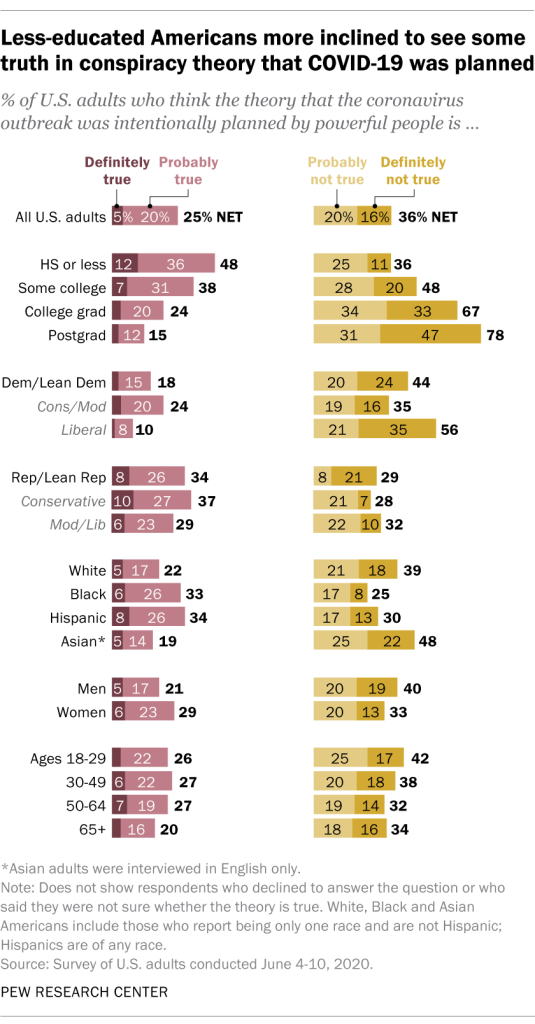Most Americans (71%) have heard of a conspiracy theory circulating widely online that alleges that powerful people intentionally planned the coronavirus outbreak. And a quarter of U.S. adults see at least some truth in it – including 5% who say it is definitely true and 20% who say it is probably true, according to a June Pew Research Center survey. The share of Americans who see at least some truth to the theory differs by demographics and partisanship.
Educational attainment is an especially important factor when it comes to perceptions of the conspiracy theory. Around half of Americans with a high school diploma or less education (48%) say the theory is probably or definitely true, according to the survey, which was conducted as part of the Center’s American News Pathways project. That compares with 38% of those who have completed some college but have no degree, 24% of those with a bachelor’s degree and 15% of those with a postgraduate degree.
This analysis about Americans’ views of the veracity of the conspiracy theory that powerful people intentionally planned the coronavirus outbreak is based on a survey of 9,654 U.S. adults, conducted June 4 to 10, 2020. Everyone who completed the survey is a member of Pew Research Center’s American Trends Panel (ATP), an online survey panel that is recruited through national, random sampling of residential addresses. This way nearly all U.S. adults have a chance of selection. The survey is weighted to be representative of the U.S. adult population by gender, race, ethnicity, partisan affiliation, education and other categories. Read more about the ATP’s methodology.
The survey was conducted as part of the Center’s American News Pathways project, which studies how Americans are engaging with and perceiving news coverage of the 2020 election and the COVID-19 pandemic. The project has tracked how Americans perceive the news about COVID-19, including the reliability of information about the pandemic.
White, Black and Asian Americans include those who report being only one race and are not Hispanic; Hispanics are of any race. Other races and ethnicities are not included.
This analysis about Americans’ views of the veracity of the conspiracy theory that powerful people intentionally planned the coronavirus outbreak is based on a survey of 9,654 U.S. adults, conducted June 4 to 10, 2020. Everyone who completed the survey is a member of Pew Research Center’s American Trends Panel (ATP), an online survey panel that is recruited through national, random sampling of residential addresses. This way nearly all U.S. adults have a chance of selection. The survey is weighted to be representative of the U.S. adult population by gender, race, ethnicity, partisan affiliation, education and other categories. Read more about the ATP’s methodology.
The survey was conducted as part of the Center’s American News Pathways project, which studies how Americans are engaging with and perceiving news coverage of the 2020 election and the COVID-19 pandemic. The project has tracked how Americans perceive the news about COVID-19, including the reliability of information about the pandemic.
White, Black and Asian Americans include those who report being only one race and are not Hispanic; Hispanics are of any race. Other races and ethnicities are not included. Asian adults were interviewed in English only.
Visit our interactive data tool to access the questions included in this post, as well as survey data about the coronavirus outbreak and the 2020 presidential election.
Partisan affiliation also plays a role in perceptions of the theory. About a third (34%) of Republicans and independents who lean to the GOP say the theory that powerful people intentionally planned the COVID-19 outbreak is probably or definitely true, compared with 18% of Democrats and Democratic leaners. It’s worth noting there is no significant difference in how likely partisans are to have heard at least a little about the theory: 72% of Republicans have heard of the claim, compared with 70% of Democrats.
Conservative Republicans are especially likely to see at least some truth in the theory: Roughly four-in-ten (37%) say it is probably or definitely true. This contrasts with 29% of moderate and liberal Republicans, 24% of moderate and conservative Democrats and 10% of liberal Democrats.
Roughly a third of Black (33%) and Hispanic adults (34%) say the theory is probably or definitely true, compared with about two-in-ten white adults (22%) and Asian Americans (19%). And women are slightly more likely than men (29% vs. 21%) to see at least some truth in the conspiracy theory that powerful people planned the outbreak.
There are some minor differences by age, too. About a quarter of adults under the age of 65 say the theory is probably or definitely true, compared with two-in-ten adults 65 and older.
Note: Visit our interactive data tool to access the questions included in this post, as well as survey data about the coronavirus outbreak and the 2020 presidential election.
"some" - Google News
July 24, 2020 at 09:07PM
https://ift.tt/32ULXnt
A look at the Americans who believe there is some truth to the conspiracy theory that COVID-19 was planned - Pew Research Center
"some" - Google News
https://ift.tt/37fuoxP
Shoes Man Tutorial
Pos News Update
Meme Update
Korean Entertainment News
Japan News Update
Bagikan Berita Ini















0 Response to "A look at the Americans who believe there is some truth to the conspiracy theory that COVID-19 was planned - Pew Research Center"
Post a Comment